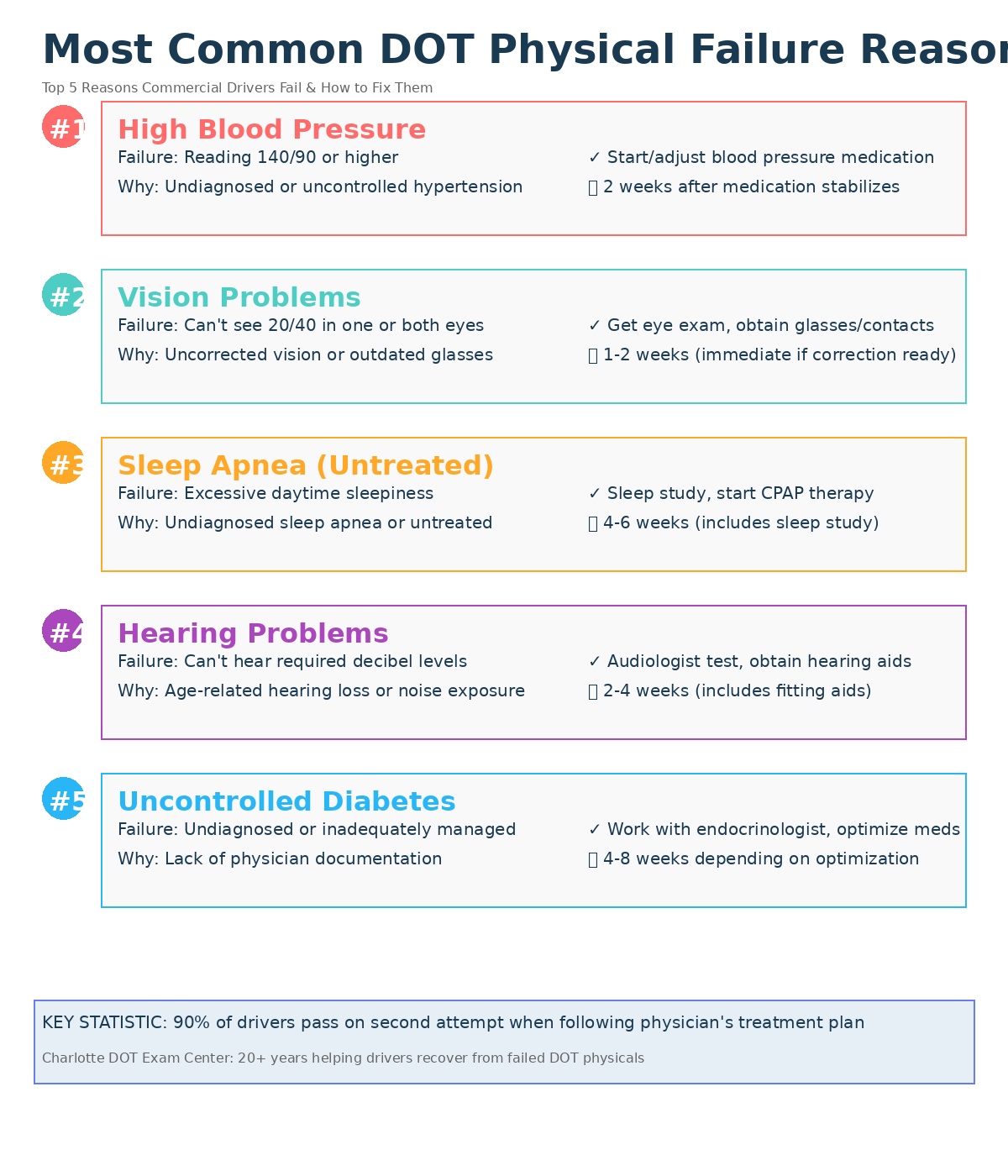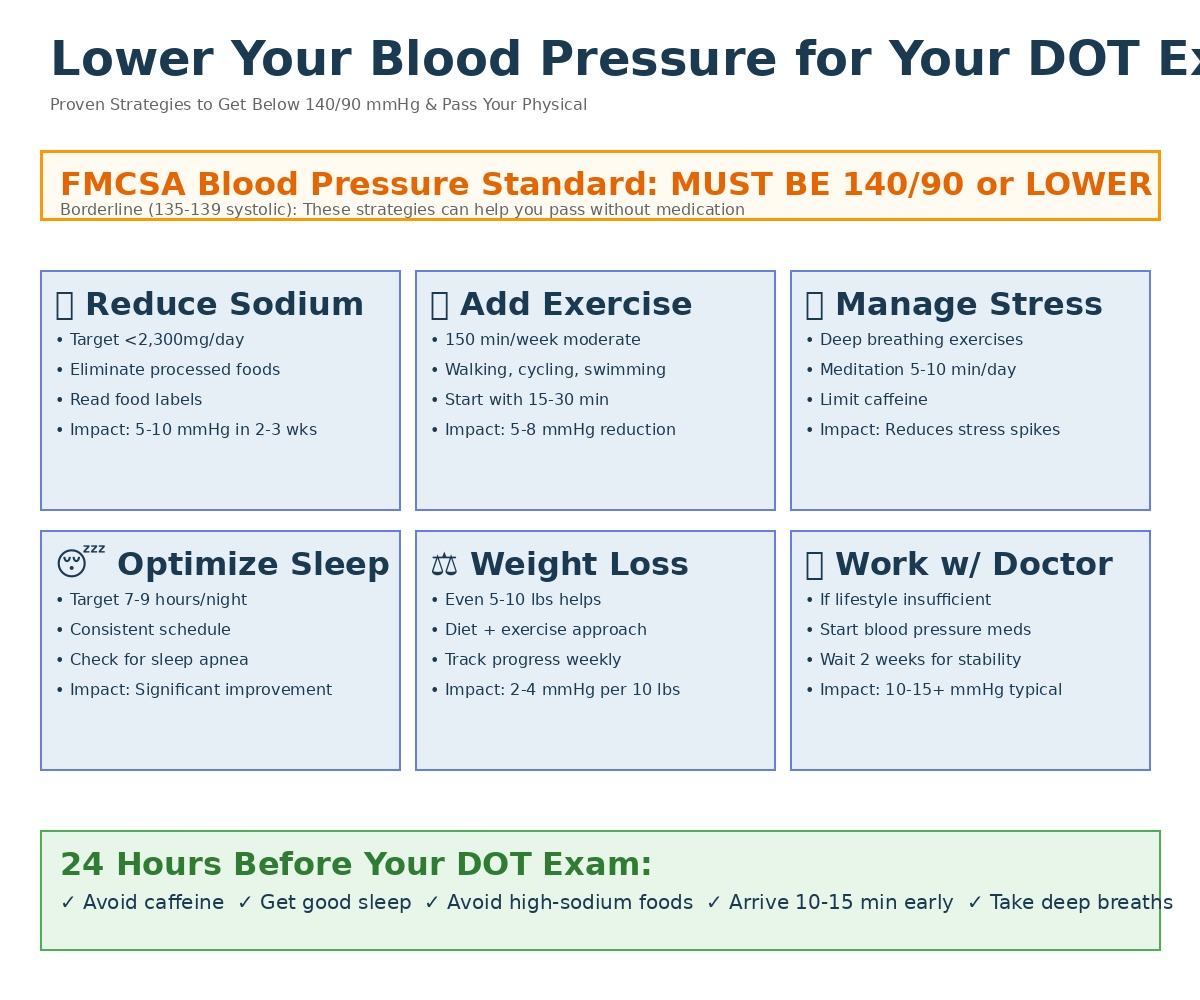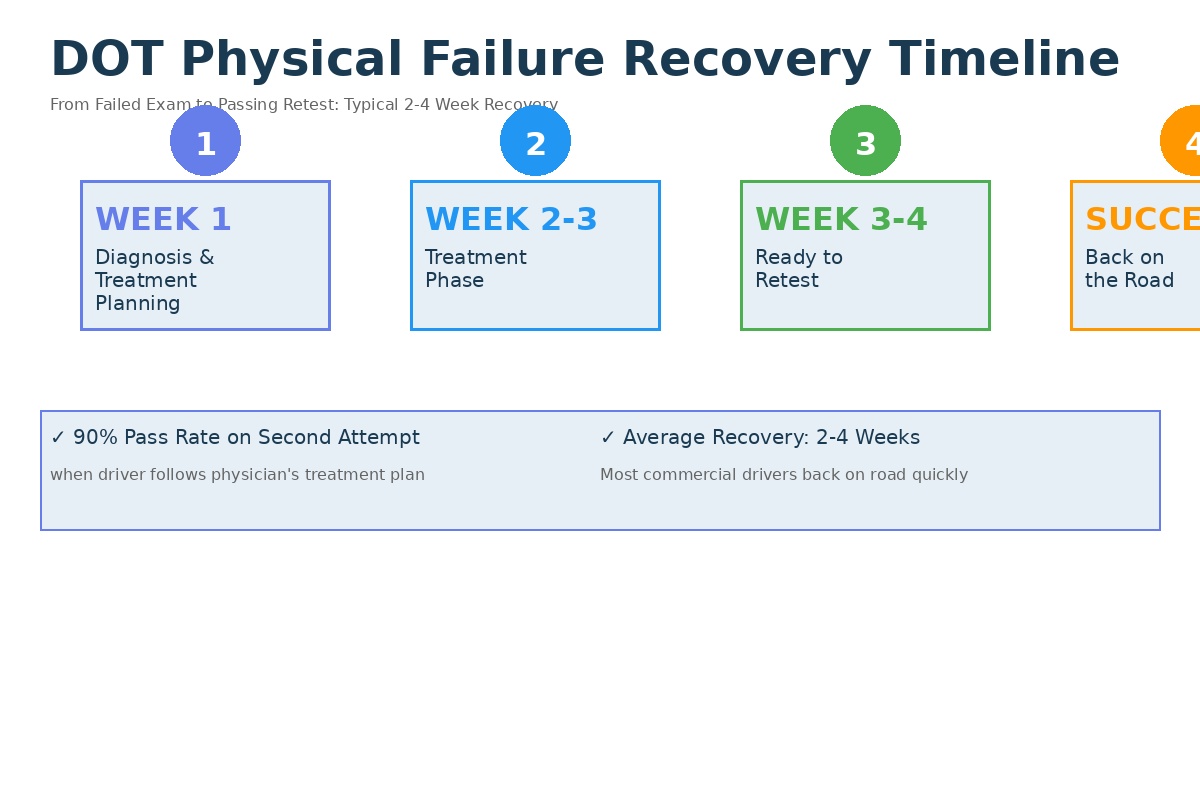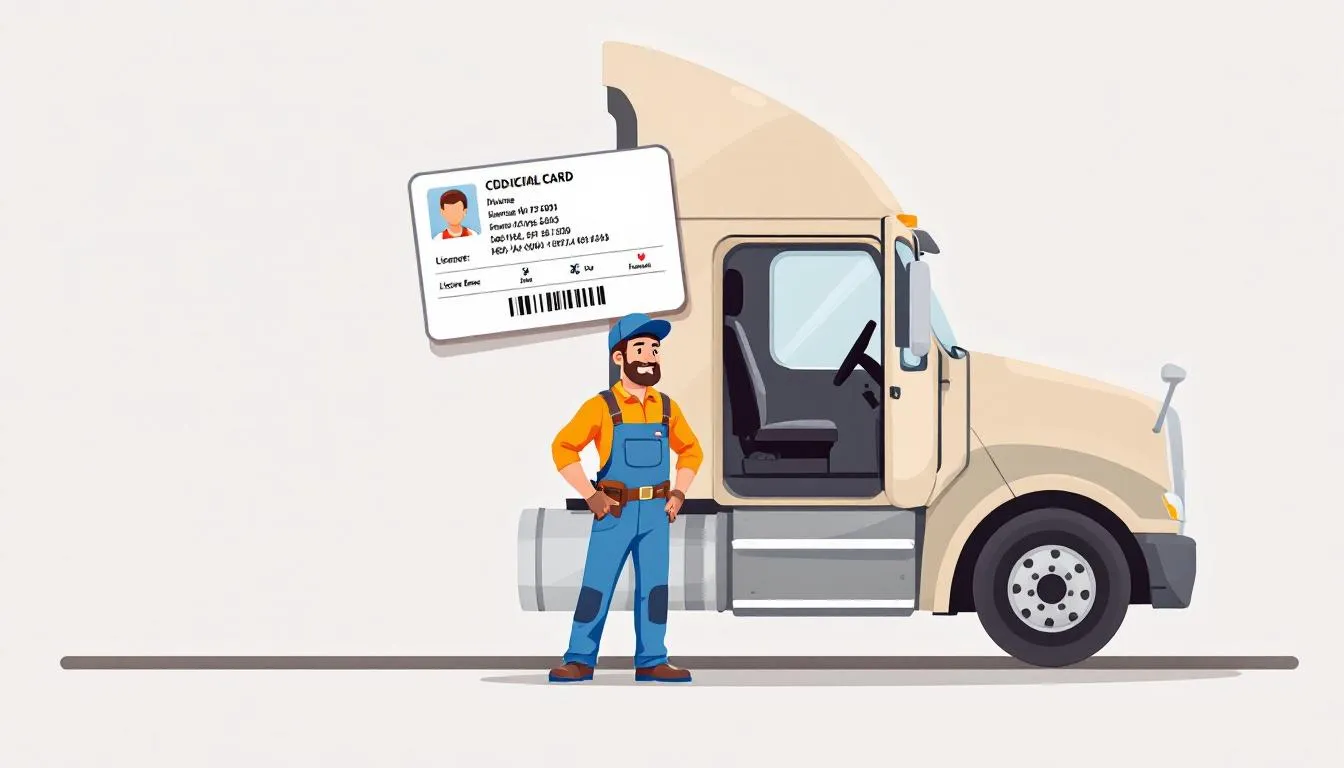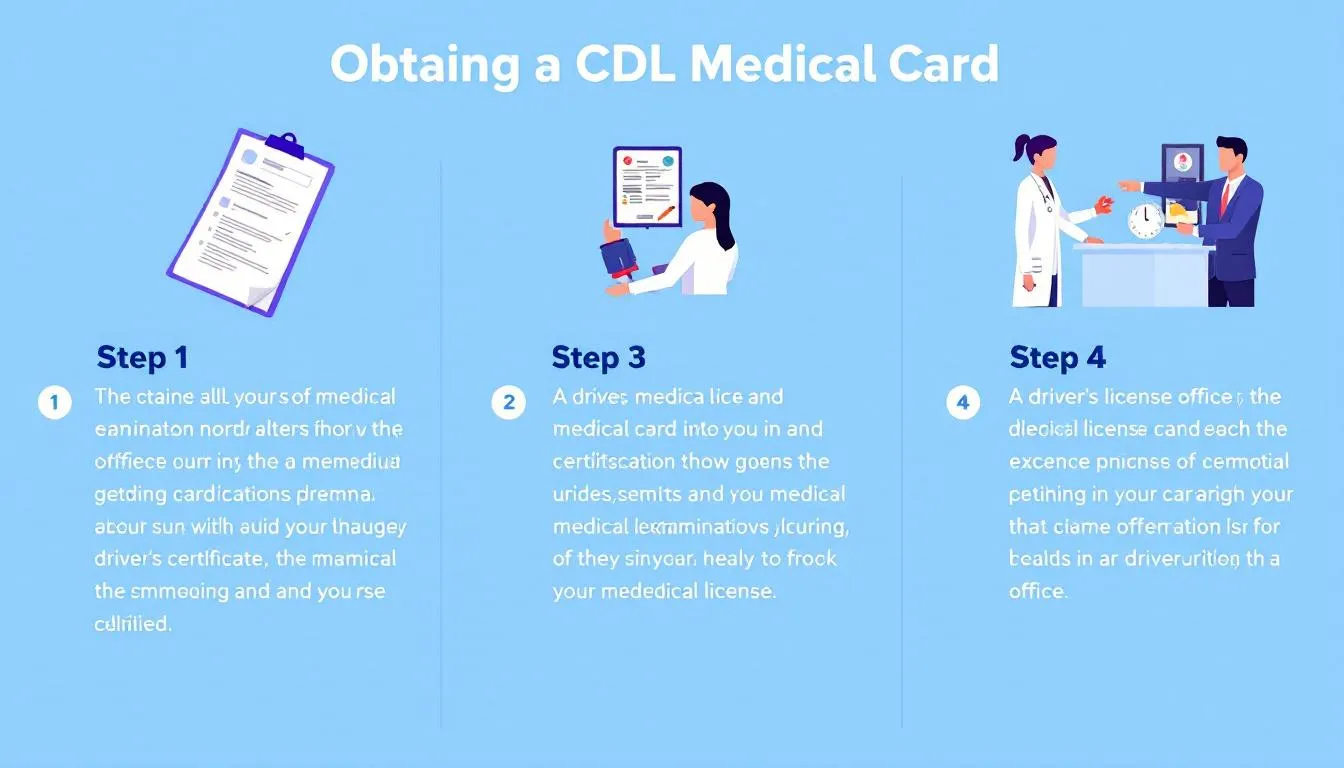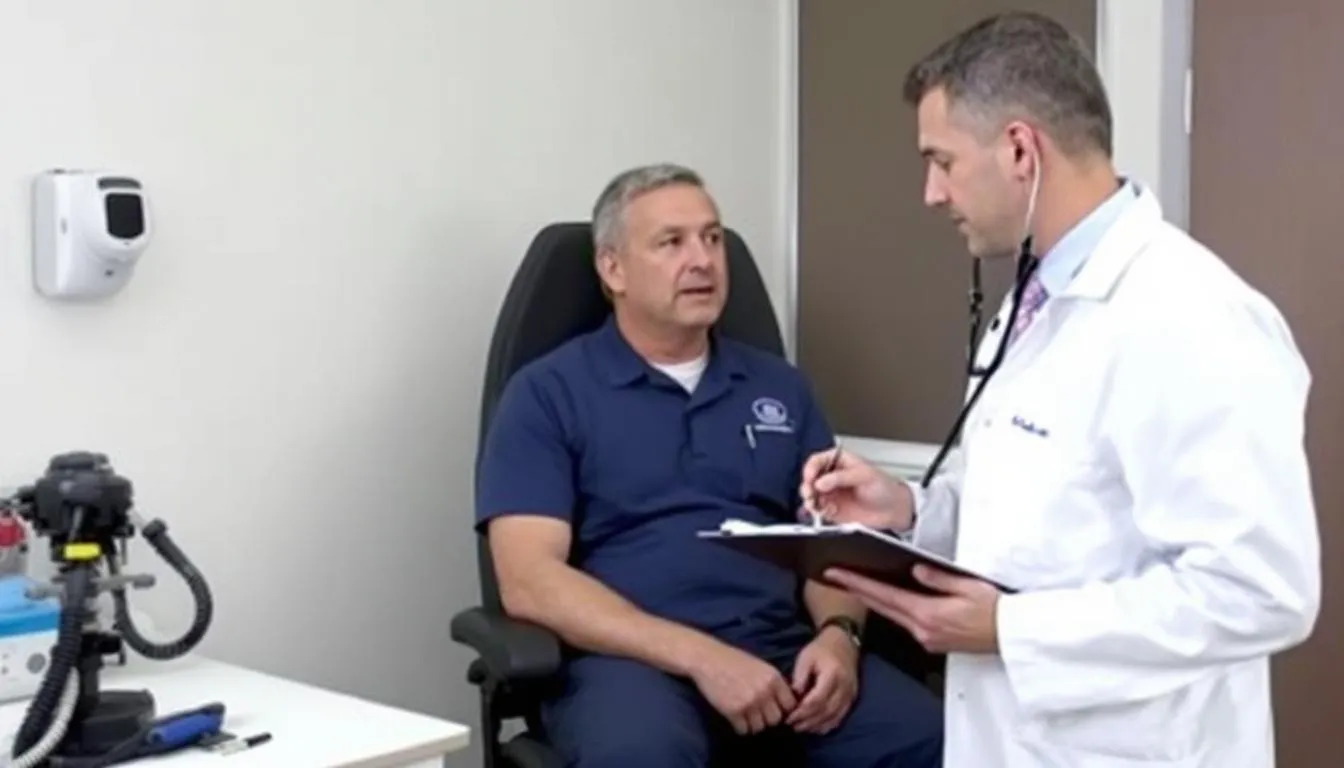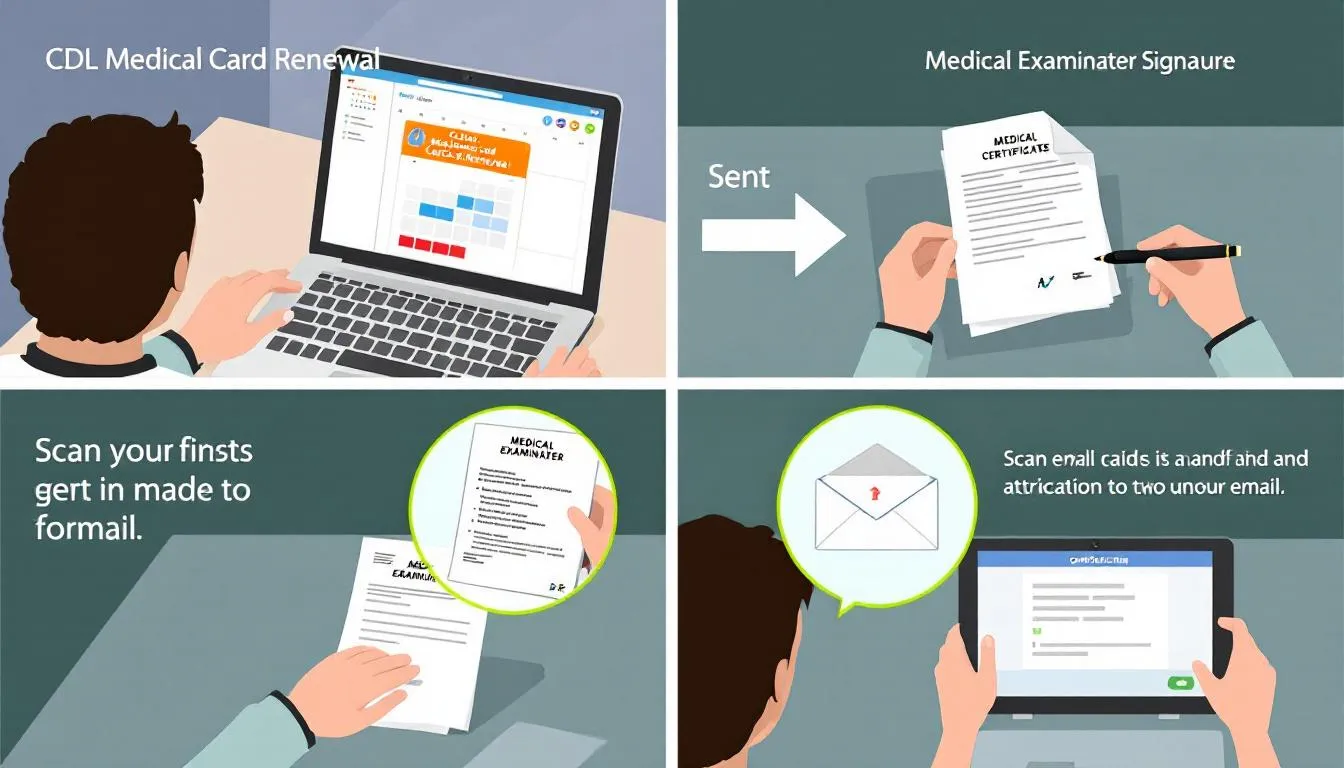TL;DR – Key Takeaways for Employers
- Employers are legally responsible for verifying and maintaining DOT medical certificates under 49 CFR 391.45
- All drivers must have a valid MCSA-5876 certificate from a certified examiner listed on the FMCSA National Registry
- Maintain Driver Qualification Files (DQFs) with current and historical certificates for all commercial drivers
- No grace period exists for expired medical certificates. Drivers must be removed from safety-sensitive duties immediately
- Keep records for three years after driver separation to remain audit-ready
- Use technology to automate expiration tracking and reduce compliance risk
DOT Medical Certificate Forms – Quick Definitions
MCSA-5875 (Medical Examination Report): The complete health examination form completed by the medical examiner. This stays with the examiner as part of their records.
MCSA-5876 (Medical Examiner’s Certificate): The wallet-sized certificate card given to the driver. This is what employers must verify and keep in Driver Qualification Files.
Introduction
As a fleet manager or HR leader, you carry significant legal responsibility for ensuring every commercial driver under your authority maintains current DOT medical certification. This is not just a paperwork exercise. It is a federal mandate that protects your company from devastating fines, liability exposure, and operational disruptions.
Non-compliance with FMCSA medical certification requirements leads to serious consequences. Penalties reach up to $16,000 per violation per day. Increased CSA scores trigger more frequent audits. Insurance premiums rise. Potential liability appears in accident litigation. When investigators examine your safety practices after an incident, your Driver Qualification Files become critical evidence of your commitment to compliance.
During FMCSA audits and legal disputes, complete and accurate medical certification records demonstrate your company’s adherence to federal safety standards. Incomplete files or expired certificates signal regulatory neglect that can result in conditional ratings, operational restrictions, or shutdown orders.
This comprehensive guide helps HR leaders and fleet managers understand their responsibilities, implement effective compliance systems, and maintain audit-ready documentation that protects both drivers and the company.
What Is a DOT Medical Certificate?
A DOT medical certificate (officially form MCSA-5876, Medical Examiner’s Certificate) is a federally mandated document proving that a commercial driver meets the physical, mental, and medical standards required to safely operate a commercial motor vehicle (CMV). This certificate is issued only by medical examiners certified by the Federal Motor Carrier Safety Administration and listed on the FMCSA National Registry.
The medical certificate is separate and distinct from a CDL license. Your driver’s CDL proves they have the skills and knowledge to operate commercial vehicles. The medical certificate confirms they are physically qualified to do so safely. Both documents must remain current for legal operation. A valid CDL means nothing without current medical certification.
Who needs DOT medical certification?
- Interstate drivers: Anyone operating CMVs across state lines with a gross vehicle weight rating (GVWR) of 10,001 pounds or more
- Intrastate drivers: Depending on state regulations, drivers operating within state boundaries may also require certification
- Specific vehicle types: Drivers of vehicles designed to transport 16+ passengers (including driver) or any quantity of hazardous materials requiring placards
For complete details on certification requirements, see our guide on who is required to have a DOT medical card and where to get a CDL medical card.
Federal regulations governing medical certification are found in 49 CFR Part 391.41 through 391.49, which establish medical standards, examination procedures, and certification requirements for commercial drivers.
Legal Employer Responsibilities (49 CFR 391.45)
Under federal law, motor carriers bear direct, non-delegable responsibility for driver medical qualification. 49 CFR 391.45 clearly states employers must:
Verify that every driver has a valid medical certificate before allowing them to operate commercial vehicles. This verification must occur before the driver’s first trip and continuously throughout employment.
Keep a copy in the Driver Qualification File for every driver. This is not optional. It is a federal requirement that must be met for every single driver under your authority.
Remove drivers from safety-sensitive duties immediately upon expiration. The moment a medical certificate expires, federal law prohibits that driver from operating CMVs. There is no grace period DOT medical card, no temporary extension, and no exceptions.
Critical compliance point: Liability for medical certification compliance cannot be delegated to drivers, independent contractors, or third-party administrators. While drivers are responsible for maintaining their own certification, employers remain legally accountable for verifying that certification exists and remains current.
Penalty structure: FMCSA can assess penalties of up to $16,000 per driver, per day for violations of medical certification requirements. Actual fines vary by enforcement action and violation severity. A single driver operating for five days with an expired certificate could result in substantial penalties. Multiply that across a fleet, and non-compliance becomes catastrophically expensive.
Understanding the relationship between CDL renewal and medical certification is essential. Review our article on CDL renewal vs DOT medical card renewal in North Carolina to understand how these separate timelines create compliance challenges.
Driver Qualification File Requirements and Retention for Employers
The Driver Qualification File serves as the official record of each driver’s qualifications, certifications, and compliance history. FMCSA regulations mandate specific contents for every DQF under 49 CFR 391.51. Medical certificates are a critical component.
DQF Must-Have Items for Medical Certification
| Item |
Proof on File |
| Current medical examiner certificate (MCSA-5876) |
Original or clear copy with unexpired date |
| Previous medical certificates |
All historical certificates during employment |
| Examiner verification |
Screenshot or printout from National Registry |
| Registry number documentation |
Examiner’s National Registry number recorded |
| Tracking system records |
Evidence of expiration monitoring process |
| Renewal correspondence |
Reminder notices sent to drivers |
Retention policy requirements:
FMCSA mandates maintaining DQFs for three years after driver separation. This means if a driver leaves your employment in January 2025, you must retain their complete file until January 2028. This requirement protects employers during investigations of incidents that occurred during the driver’s employment.
Common DQF compliance errors that trigger audit findings:
- Missing historical medical certificates from previous employment periods
- Certificates from examiners not listed on the National Registry
- No documentation verifying examiner certification status
- Gaps in medical certification during employment periods
- Incomplete tracking records showing renewal monitoring
- Expired certificates remaining in files without evidence of driver removal from service
For North Carolina employers, understanding state-specific submission requirements is also critical. See our guide on how to submit DOT medical cards to NC DMV.
DOT Medical Certificate Verification Process for Employers
Effective HR compliance for CDL drivers requires a systematic verification process every time a driver provides a medical certificate. Follow this step-by-step employer checklist:
Step 1: Obtain copy of driver’s MCSA-5876 certificate
Request the original or a clear copy immediately upon issuance. The certificate must include the examiner’s name, National Registry number, expiration date, and any restrictions or limitations.
Step 2: Verify examiner on FMCSA National Registry
Visit the FMCSA National Registry and confirm the examiner was certified on the date they performed the examination. This medical examiner certification lookup takes only minutes. Search by name or National Registry number. Record the examiner’s National Registry number and a dated screenshot in the DQF.
Step 3: Document verification in Driver Qualification File
Record that you verified the examiner’s certification. Include the examiner’s National Registry number, verification date, and the name of the person who performed the verification. This documentation proves you followed proper verification procedures.
Step 4: Input expiration date into tracking system
Enter the certification expiration date into your fleet management system, compliance software, or tracking spreadsheet. Ensure this data is accessible to dispatch, HR, and safety personnel who might need to verify driver qualification status.
Step 5: Set renewal alerts 60-90 days prior to expiration
Program automated reminders for 90 days, 60 days, 30 days, and 7 days before expiration. Multiple touchpoints ensure drivers receive adequate notice and management can intervene if renewals are not completed timely. Consider sharing our guide on preparing for your DOT medical exam with drivers as part of your reminder workflow.
Recommended tools: Electronic verification systems streamline this process significantly. Many compliance management platforms offer integration with the FMCSA National Registry, automatic examiner verification, and expiration tracking with escalating alerts.
Recordkeeping and Retention Requirements
Federal regulations establish clear requirements for how long employers must maintain medical certification records and in what format.
Mandatory retention timeframes:
- During employment: All current and historical medical certificates must remain in the DQF
- After separation: Complete DQF must be retained for three years following driver’s last day of employment
- Post-accident: Records may need to be preserved longer if involved in accident investigation or litigation
Electronic vs. paper records:
FMCSA allows electronic DQF storage if systems meet specific requirements: protection against alteration, backup procedures, accessibility during audits, and retrieval capabilities. Most modern fleet management systems satisfy these requirements. Paper files remain acceptable if properly maintained.
Accessibility during audits:
During FMCSA or state compliance reviews, auditors must be able to access complete DQFs within a reasonable timeframe. Typically this means minutes to hours, not days. Whether electronic or paper-based, your system must allow rapid retrieval of any driver’s complete file including all historical medical certificates.
Best-practice DQF folder structure:
Organize each driver’s medical documentation chronologically with clear labeling:
Driver Name – DOT Number
├── Medical Certificates
│ ├── Current: Medical Certificate – Exp. 03/2027
│ ├── Previous: Medical Certificate – Exp. 03/2025
│ └── Historical: Medical Certificate – Exp. 03/2023
├── Registry Verifications
│ ├── Examiner Verification – Dr. Smith – 03/2025
│ └── Examiner Verification – Dr. Jones – 03/2023
└── Renewal Tracking
├── Renewal Reminders Sent
└── Compliance Log
This structure ensures auditors can quickly verify continuous medical qualification throughout the driver’s employment history.
FMCSA and State Audit Requirements
Understanding what triggers audits and what auditors examine helps employers maintain perpetual audit readiness rather than scrambling when notified of an investigation.
Common audit triggers:
- Crash investigations: Any serious accident involving a CMV typically triggers review of the driver’s DQF
- Complaint-based reviews: Reports from drivers, competitors, or the public can initiate audits
- Random compliance reviews: FMCSA conducts periodic random audits based on fleet size and safety ratings
- New entrant audits: Companies receiving interstate authority within the past 18 months face mandatory safety audits
- CSA-based targeting: High scores in Compliance, Safety, Accountability program trigger increased scrutiny
What auditors examine in medical certificate documentation:
Auditors systematically review DQFs looking for evidence of compliance or violations. They check:
- Whether every driver had current medical certification on every day they operated CMVs
- If certificates came from certified examiners listed on the National Registry at the time of examination
- Whether the employer documented verification of examiner certification
- If expired certificates exist in files without corresponding evidence of driver removal from service
- Whether tracking systems demonstrate proactive expiration monitoring
- If retention policies meet the three-year post-separation requirement
Use this DQF audit checklist:
- Current certificate on file
- All historical certificates present
- No gaps in certification timeline
- Examiner verification documented
- Registry number recorded
- Expiration tracking evidence
- Removal documentation if lapses occurred
Common audit findings:
The most frequent medical certification violations identified during audits include:
- Drivers operating with expired medical certificates (often by just a few days)
- Certificates from examiners not listed on the National Registry
- Missing documentation of examiner verification
- Incomplete DQFs lacking historical certificates
- No evidence of systematic expiration tracking
Penalties and CSA score impact:
Violations result in both financial penalties and CSA score degradation. Medical certification violations contribute to your Safety Fitness Determination rating, which can result in:
- Conditional or Unsatisfactory safety ratings
- Increased audit frequency
- Higher insurance premiums
- Loss of eligibility for certain contracts or lanes
- In severe cases, operations shutdown orders
Compliance tip: Do not wait for audit notification to ensure compliance. Maintain audit-ready documentation year-round by conducting quarterly internal DQF reviews, addressing gaps immediately, and treating every day as if an audit could begin tomorrow.
Common Employer Compliance Mistakes
Understanding frequent compliance failures helps you avoid these costly errors:
1. Accepting certificates from non-certified examiners
Some employers receive medical certificates without verifying the examiner holds current FMCSA certification. Certificates from non-certified providers are invalid. Drivers operating with these certificates are considered unqualified under federal law. Always verify examiner certification through the National Registry.
2. Failing to track expiration dates systematically
Relying on drivers to self-report renewals or using informal tracking methods (sticky notes, desk calendars) creates inevitable gaps. Even the most conscientious driver may forget a renewal deadline. Informal systems fail during personnel changes or busy periods.
3. Keeping incomplete DQFs
Missing historical certificates, lacking examiner verification documentation, or failing to document your tracking process creates audit vulnerability. Complete files tell the compliance story. Incomplete files raise red flags.
4. Assuming electronic submission equals compliance
Many employers mistakenly believe that because the medical examiner electronically submitted the certificate to the national registry and the DMV, their compliance obligation is satisfied. Not true. Employers must independently verify certification, maintain copies in DQFs, and document their verification process regardless of electronic submission.
5. Continuing to dispatch expired drivers
The costliest mistake is allowing drivers to operate after medical certification expires. There is absolutely no grace period for DOT medical cards. Expiration means immediate disqualification from safety-sensitive duties. Even a single day of operation with expired certification creates significant liability and penalty exposure.
6. Not verifying examiner certification
Assuming every healthcare provider performing DOT physicals holds proper FMCSA certification leads to invalid certificates in your files. Verification takes minutes and protects your company from operating drivers without valid medical qualification.
Technology Solutions for Compliance
Modern compliance management software transforms medical certification tracking from a manual, error-prone process into an automated, reliable system.
Benefits of compliance management software:
Automated expiration tracking: Systems continuously monitor all driver medical certificate expiration dates and generate alerts according to your specified timeline. Typically 90, 60, 30, and 7 days before expiration. This automation eliminates human error and ensures no driver’s certification lapses without management awareness.
Cloud-based DQF storage: Electronic document management systems provide secure, accessible storage for all driver qualification documentation. Authorized personnel can access files from any location. The system maintains automatic backups preventing data loss.
Integration with dispatch and HR systems: Advanced platforms integrate with your existing operational systems. They automatically flag drivers with expired or soon-to-expire certifications in dispatch software. This prevents assignment to loads when certification lapses.
Instant audit access: When auditors request documentation, cloud-based systems allow immediate retrieval and presentation of complete files. Some platforms generate audit reports showing continuous compliance for all drivers across any specified timeframe.
Cost savings vs. penalties: Consider the return on investment. A comprehensive compliance management system typically costs $30 to $100 per driver annually. Compare this to the potential penalty of up to $16,000 per driver, per day for operating without valid medical certification. A single prevented violation pays for the software investment many times over.
Telematics and DMV database integration: Sophisticated systems integrate with vehicle telematics to monitor vehicle operation against driver certification status. Some connect to state DMV databases to verify license status alongside medical certification. These integrations create a comprehensive view of driver qualification.
Example scenario: Fleet management systems can automatically flag expired DOT cards in dispatch software. This prevents assignment of loads to disqualified drivers. When dispatch attempts to assign a driver to a route, the system checks medical certificate status in real-time and blocks the assignment if certification has lapsed. The system displays an alert: “Driver Smith – Medical Certificate Expired 10/01/2025 – Not Qualified for CMV Operation.”
Risk Mitigation Strategies for Employers
Proactive compliance management reduces risk and creates a culture of safety throughout your organization.
Conduct quarterly DQF audits
Designate a compliance officer or safety manager to review every driver’s qualification file quarterly. This internal audit identifies gaps before external auditors find them. Create a standard checklist covering:
- Current medical certificate verification
- Examiner certification confirmation
- Expiration date accuracy in tracking systems
- Complete historical certificate retention
- Proper documentation of verification procedures
Train HR and dispatch teams on medical certification rules
Everyone who interacts with driver qualification must understand the requirements. Conduct annual training covering:
- Federal medical certification requirements
- How to verify examiner certification
- Expiration date monitoring procedures
- Immediate removal requirements when certification lapses
- Documentation standards for DQFs
- Penalty exposure for violations
Implement written compliance policies
Document your medical certification procedures in written policies accessible to all relevant personnel. Written policies demonstrate organizational commitment to compliance and provide clear guidance during personnel transitions. Include:
- Verification procedures for new certificates
- Expiration tracking methodology
- Renewal reminder protocols
- Driver removal procedures for expired certification
- DQF maintenance standards
- Audit response procedures
Create progressive discipline system for drivers missing renewal deadlines
While employers hold ultimate responsibility, drivers must participate in maintaining their qualification. Establish and enforce consequences for drivers who fail to complete timely renewals:
- First offense: Written warning and mandatory renewal within 48 hours
- Second offense: Suspension from driving duties until renewed
- Third offense: Potential termination for pattern of non-compliance
Document this policy in your driver handbook and apply it consistently.
Keep detailed renewal logs
Maintain comprehensive records showing when renewal reminders were sent to drivers, driver acknowledgment of reminders, scheduled renewal appointments, and completion confirmation. This documentation demonstrates your proactive compliance efforts.
Maintain redundancy in oversight
Do not rely on a single person or department to monitor medical certification compliance. Assign primary responsibility to safety or HR. Ensure dispatch also has access to expiration data and can identify qualification issues before assigning loads. This redundancy catches mistakes that slip through single-point systems.
For North Carolina-specific considerations, understand the unique blood pressure requirements for DOT exams that frequently affect certification duration.
North Carolina Employer Considerations
Operating in North Carolina creates additional compliance layers due to state-specific regulations regarding medical certificate submission and CDL maintenance.
NC DMV submission requirements:
North Carolina requires different submission processes depending on driver classification:
- Interstate drivers: Medical certificates are transmitted electronically to the national FMCSA database, which interfaces with the NC DMV system
- Intrastate drivers: May require manual submission of medical certificates directly to NC DMV to maintain proper CDL classification
DMV processing delays and compliance impact:
Even after drivers submit medical certificates to the NC DMV, processing delays can create discrepancies between the driver’s actual qualification status and their DMV record. While federal law bases qualification on …


